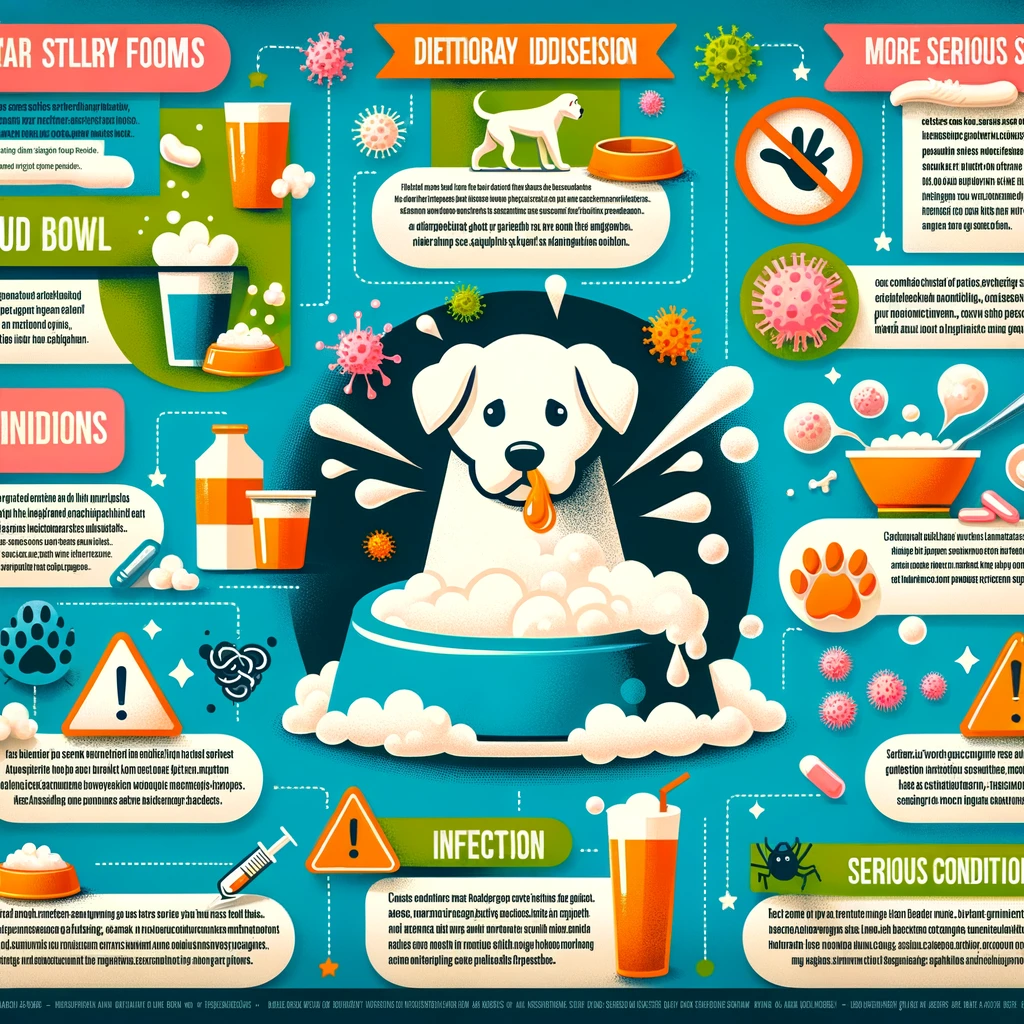
Why does my dog keeps throwing up white stuff ? As a dog owner, it can be distressing to see your furry friend vomit, especially when it involves white foam. While occasional vomiting is not uncommon, persistent episodes may indicate underlying issues that need attention. In this blog post, we’ll explore some common reasons why dogs vomit white foam and what steps you can take to ensure your pet’s health.
Why does my dog keeps throwing up white stuff ?

Indigestion:
One of the most common reasons for white foam vomiting in dogs is indigestion. Dogs have a knack for getting into things they shouldn’t, whether it’s nibbling on grass, licking something with a bad taste, or chewing on irritating objects. If your dog has recently ingested something disagreeable, it could lead to a bout of indigestion.
Acid Reflux (Bilious Vomiting Syndrome):
Excess stomach acids or bile can irritate your dog’s stomach, leading to the expulsion of white foam. This is often observed in the morning, especially before breakfast. Adjusting your dog’s feeding schedule by providing smaller, more frequent meals or a snack before bedtime might help manage this condition.
Pancreatitis:
Inflammation of the pancreas can cause frequent vomiting, and the vomit may appear white and foamy if the stomach is empty. Keep a close eye on additional symptoms such as pain, loss of appetite, and diarrhea. If you notice these signs, it’s crucial to consult your veterinarian promptly.
Gastrointestinal Issues:
Various gastrointestinal problems, including viral or bacterial inflammation, can lead to white foam vomiting in dogs. If the vomiting persists or is accompanied by other concerning symptoms, seeking veterinary advice is recommended.
Foreign Body Ingestion:
Dogs are notorious for swallowing things they shouldn’t, such as toys or bones. If your dog has ingested a foreign object, it can lead to gastrointestinal obstruction, a serious condition that requires immediate veterinary attention if vomiting persists.
Toxin Exposure:
Ingesting toxic substances, including certain foods, medications, cleaning supplies, or plants, can result in white foam vomiting. If you suspect your dog has ingested something toxic, seek veterinary help immediately.
What to Do If Your Dog is Vomiting White Foam: Understanding the Signs and Seeking Veterinary Care

It can be concerning for any pet owner to witness their dog vomiting, especially when it involves white foam. While occasional vomiting may not be an immediate cause for alarm, it’s crucial to pay attention to your dog’s behavior and take action if additional symptoms arise. Here’s a guide on what to do if your dog is vomiting white foam:
1. Assess the Situation: If your dog vomits white foam just once and is otherwise acting normally, there might not be an immediate cause for concern. However, it’s essential to monitor your pet closely.
2. Withhold Food: To give your dog’s stomach a chance to settle, withhold the next meal. This fasting period can be beneficial, especially if the vomiting was due to a minor issue like indigestion.
3. Observe Additional Symptoms: If your dog displays other symptoms along with vomiting white foam, such as weakness, lethargy, loss of appetite, diarrhea, blood in the vomit, or shaking, it’s time to contact your veterinarian.
4. Veterinary Consultation: Reach out to your vet if your dog vomits more than twice in a 24-hour period or if intermittent vomiting persists for more than a day. Additionally, seek professional advice if other signs of illness accompany the vomiting.
How Vets Diagnose Vomiting White Foam:
Upon contacting your veterinarian, they will conduct a thorough examination of your dog, considering both recent and long-term medical history. Providing details about any suspected ingested substances, such as plants or chemicals, is crucial for accurate diagnosis.
Further diagnostic testing, including blood and urine tests, X-rays, and ultrasound, may be recommended, especially if there is suspicion of an intestinal obstruction or bloat.
Treatment for Vomiting in Dogs:
Treatment strategies depend on the underlying cause of vomiting. In many cases, veterinarians may administer anti-nausea medications and gastric protectants via injection to prevent further vomiting. Hospitalization, intravenous fluids, and frequent medication dosing may be necessary for dogs with dehydration, pancreatitis, or other health concerns.
If toxin exposure is suspected, your vet will follow established protocols for treatment, which may include hospitalization.
For cases involving gastrointestinal obstruction, endoscopy or surgery may be required, often followed by a hospital stay for post-operative care.
In emergency situations like bloat, immediate action is crucial. This involves decompressing the stomach gases through gastric lavage and potentially surgery.
Supportive Care at Home:
For less severe cases, such as simple indigestion, your dog may recover within a day or so. Provide plenty of water, but avoid treats, rich foods, or large meals for the first 24 hours. If your dog doesn’t show improvement, consult your vet for further guidance.
In any case, always prioritize your dog’s well-being and seek professional advice when in doubt. Regular communication with your veterinarian ensures the best care for your furry friend.



